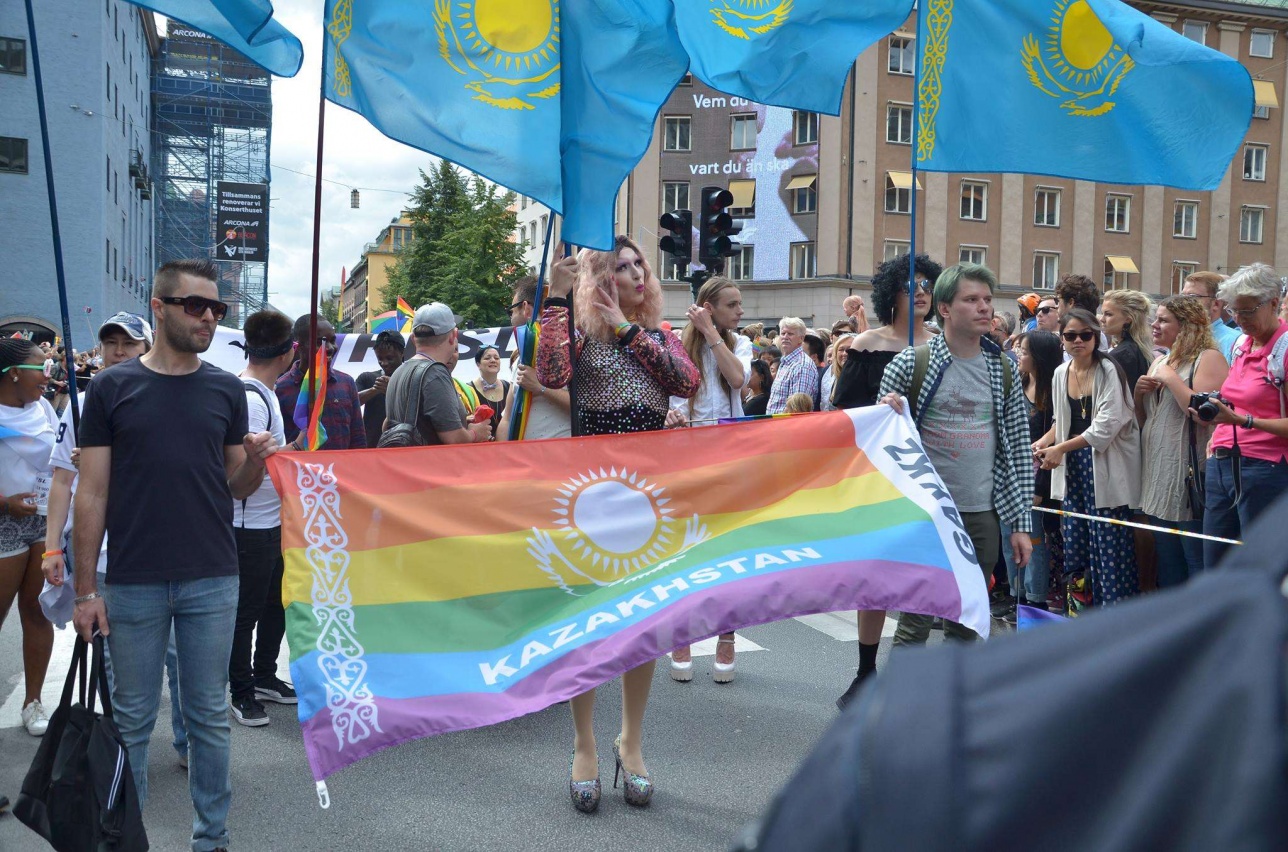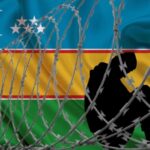Erlan Aubakirov, a 35-year-old Muslim from Petropavl [Petropavlovsk] in North Kazakhstan Region, came close to facing criminal charges for launching a Muslim group on the smartphone messaging service WhatsApp. He was eventually fined under the Administrative Code for distributing uncensored religious literature after police decided no basis for a criminal prosecution existed.
Abubakirov was among many punished for violating Kazakhstan’s strict censorship of all religious literature published, printed or distributed in the country – including online and on social media – or imported into the country (see Forum 18’s Kazakhstan religious freedom survey http://www.forum18.org/archive.php?article_id=1939).
Two Council of Churches Baptists were fined in East Kazakhstan Region for offering uncensored religious literature to others (see below).
After two young members of a Council of Baptists congregation in Karaganda [Qaraghandy] Region were stopped while offering uncensored New Testaments and other religious literature on the streets, their parents were summoned and threatened. One of the girls was summoned by the psychologist at the College where she is studying and questioned about her faith and whether any other students attend her community. Her father was fined (see below).
The Muslim and the three Council of Churches Baptists were each fined 50 Monthly Financial Indicators (MFIs), 106,050 Tenge (2,600 Norwegian Kroner, 290 Euros or 320 US Dollars). This represents more than a month’s average wages for those in formal work, though much more for pensioners or the unemployed.
Council of Churches Baptists follow a policy of civil disobedience, refusing to pay fines for exercising the right to freedom of religion or belief. Many Baptists who refuse to pay such fines are then place on Kazakhstan’s exit blacklist, preventing them from leaving the country. Some have property confiscated, such as washing machines or cars. Others have restraining orders placed on property, such as homes, cars or calves, preventing them from selling or disposing of them (see F18News 13 May 2016 http://www.forum18.org/archive.php?article_id=2177). Punishment can also include short-term jail sentences.
Three Council of Churches Baptists in Aktobe [Aqtobe] Region were jailed in September for up to three days for failing to pay earlier fines for offering uncensored religious literature to others (see below).
Three further religious books – all Sunni Muslim works linked to the banned Muslim missionary group Tabligh Jamaat – have been banned as “extremist” (see below).
OSCE call to abolish religious censorship
The Organisation for Security and Co-operation in Europe (OSCE) has called on Kazakhstan to remove legal provisions which enforce the compulsory prior religious censorship. The call came in its Preliminary Opinion on the Draft Amendments to the Legal Framework on Countering Extremism and Terrorism, issued on 6 October (http://legislationline.org/download/action/download/id/6423/file/296_TERR-KAZ_6Oct2016_en.pdf).
The Preliminary Opinion was issued as Kazakhstan’s Parliament, the Majilis, is considering a wide-ranging anti-“extremism” Amending Law. If adopted in current form, the amendments would increase still further state-imposed pre-publication censorship of all literature about religion (see F18News 31 August 2016 http://www.forum18.org/archive.php?article_id=2212).
The OSCE Preliminary Opinion points out that “it is generally questionable whether a state body is able to or should be involved in assessing any material with religious content”. And it adds: “The rights to freedom of religion or belief, and to freedom of expression exclude any discretion on the part of the State to determine whether religious beliefs or the means used to express such beliefs, including religious literature or any other materials containing so-called ‘religious content’, are legitimate.”
The OSCE described the state religious censorship as “a system of authorization which appears to be an excessive, disproportionate and unnecessary limitation to the right to acquire, possess, use, produce, import and disseminate religious publications and materials, which is an integral component of the right to freedom of religion or belief”.
The OSCE Preliminary Opinion called on Kazakhstan to delete proposed amendments to Article 9, Parts 3 and 3-1, of the Religion Law and Article 490, Part 3 of the Administrative Code, “thereby removing the requirement of obtaining an ‘expert opinion’ prior to the use of religious material or literature and excluding administrative liability for failure to do so”.
To implement this recommendation, provisions in the existing Religion Law and Administrative Code enacting such religious censorship would also need to be amended.
Petropavl: Criminal investigation over Muslim WhatsApp group
Trouble began for Erlan Aubakirov, a 35-year-old Muslim from Petropavl, when North Kazakhstan Regional Police opened a criminal case against him after “operational information” arrived on 7 January that he had set up a Muslim group named “Akhli sunna” on WhatsApp and had begun to share religious texts. The police insisted this is illegal and seized his mobile phone.
The subsequent court decision in the administrative case against Aubakirov did not reveal how the police had discovered that he had launched the WhatsApp group.
Police investigated Aubakirov under the broadly-framed Criminal Code Article 174, Part 1. This Article punishes “incitement of social, national, clan, racial, or religious hatred or antagonism” with a prison term of two to seven years.
Three prisoners of conscience are known to be serving prison terms under Criminal Code Article 174, Part 1. Two are Sunni Muslims accused of membership of the Tabligh Jamaat missionary movement, Saken Tulbayev and Khalambakhi Khalym. The third is a Seventh-day Adventist Yklas Kabduakasov. All three denied they had inspired hatred of anyone (see F18News 10 October 2016 http://www.forum18.org/archive.php?article_id=2223).
However, on 25 March, an “expert analysis” of Aubakirov’s phone and the religious texts he posted on the WhatsApp group found that he had not incited “social, national, clan, racial, or religious hatred or antagonism”. However, it claimed that the religious texts were “not recommended for use on the territory of Kazakhstan” as they violate the Constitution and laws.
On 31 May the Investigative Department of North Kazakhstan Regional Police closed the criminal case against Aubakirov after ruling that no crime had been committed. Instead, the case was handed to the Regional Religious Affairs Department, the body entitled to launch administrative cases to punish people for exercising the right to freedom of religion or belief.
On 4 June, Religious Affairs Department chief specialist Bolat Omarov launched a case against Aubakirov under Administrative Code Article 490, Part 1, Point 3, according to the subsequent court decision. This Article punishes: “Violating the requirements of the Religion Law for .. import, production, publication and/or distribution of religious literature and other religious materials, and items for religious use”. The punishment for individuals is a fine of 50 MFIs.
The administrative case was handed to Petropavl Specialised Administrative Court. There, on 23 June, Judge Aigul Akpanova found Aubakirov guilty, according to the decision seen by Forum 18. She fined him the prescribed 50 MFIs, 106,050 Tenge. She banned him from conducting unspecified activity for one month. She also ordered that his confiscated mobile phone should be returned “with deletion from the phone’s memory of information of religious content”.
Aubakirov does not appear to have appealed against the punishment to North Kazakhstan Regional Court and the decision came into force on 5 July, according to court records.
On 19 July, court bailiffs in Petropavl began proceedings to recover the fine from Aubakirov, according to Justice Ministry records. Court bailiffs were unable to tell Forum 18 on 17 October what action, if any, had been taken against Aubakirov.
Petropavl: “What state censorship?”
Religious Affairs Department chief specialist Omarov defended the prosecution of Aubakirov, but was unable to explain what he had done wrong. “It’s all in the court decision,” Omarov insisted to Forum 18 from Petropavl on 17 October. “There was an expert analysis which found the materials in the group he had set up were not recommended.” He said he was unable to remember what materials Aubakirov had posted to the group.
Forum 18 tried to find out which religious materials were “recommended” and which not. Despite repeatedly asking if, for example, the Koran is among religious materials “recommended” for people to read, Omarov refused to say.
Asked why people face state censorship over what religious materials they are allowed to have access to, Omarov responded: “What state censorship?” He then put the phone down.
Kalbatau: Literature seizure, fines
On 16 June, two Council of Churches Baptists from Taldykorgan [Taldyqorghan] visited the village of Kalbatau in East Kazakhstan Region. There they offered “leaflets and Gospels to all who wanted them”, Baptists told Forum 18. They also invited people to attend the festival of the Trinity with other members of the Kalbatau Baptist church to be held on the following Sunday, 19 June.
Akimat (Administration) officials detained them that evening on the central streets of the village and took them to the police. Officers seized their religious literature, questioned them and then let them go. The investigator summoned them the following day, warning them that they had committed an administrative offence and would be brought to court where they lived.
On 13 September, Judge Maikul Mamutova of Taldykorgan Specialised Administrative Court found both Lozovoi and Pikalina guilty under Administrative Code Article 490, Part 1, Point 3, according to the decisions seen by Forum 18. She fined each 50 MFIs, 106,050 Tenge. Lozovoi was recorded as unemployed, while Pikalina is a pensioner who was then approaching her 67th birthday.
The court decisions do not reveal what happened to the religious literature the police seized from Lozovoi and Pikalina.
Although Lozovoi and Pikalina intended to appeal against the punishments, Forum 18 can find no record that they did so.
Zhezkazgan: Literature seizure, warning, fine, psychologist
On the afternoon of 6 August, police officers detained two young Council of Churches Baptists as they offered religious literature – including the New Testament in Kazakh and Russian – on the streets of Zhezkazgan in Karaganda Region. As the two girls were aged 16, officers then summoned their parents. The father of one of the girls is a church pastor. (Forum 18 knows the names of the girls and the pastor.)
“All were interrogated and forced to write statements,” local Baptists told Forum 18. Officers took some of the literature for an “expert analysis” and the Baptists were warned that materials on the case would be sent to the Akimat. They were then allowed home.
On 29 August, Shamil Nurbek of the Akimat drew up a record of an offence against the Pastor.
Zhezkazgan: Summoned, warned
On 5 September, Akimat officials summoned the two girls and their parents to an administrative Commission for the protection of the Rights of Minors. Also summoned was Lyazzat Ranova, head of Zhezkazgan Medical College where the two girls study, as well as the headteacher and other staff from the school where the Pastor’s daughter had studied earlier.
“The Commission issued a warning to the parents that they do not have the right to force their religious beliefs on their children,” Baptists complained to Forum 18. They warned that if such a thing happened again, the two girls would be “placed on a register”.
Forum 18 was unable to reach officials of the Akimat Commission on 17 October. Its chair, Deputy Akim Zina Akilbekova, was on leave, while the telephone of Commission secretary went unanswered each time Forum 18 called. A former member of the Commission, Gulnar Seitzhanova of the Education Department, told Forum 18 that during her time on the Commission she could not recall a case where parents were summoned and warned over their or their children’s religious activity.
The following day, 6 September, a psychologist at the Medical College summoned the Pastor’s daughter in the middle of lessons. She asked her what literature she reads, what she does in her spare time and who else among the students attends church.
On 8 September, first-year students of the Medical College and their parents were summoned to attend a lecture on the subject “Prevention of religious extremism and terrorism, prevention of legal offences and self-destructive conduct among youth”. The Medical College website shows rows of students dressed in white medical overalls and hats listening to the lecture.
Students and their parents were told that two of the College’s students had been giving out religious literature in the town and that their parents had been fined. “Students were warned to notify the authorities of similar instances,” Baptists told Forum 18.
Medical College head Ranova claimed to Forum 18 on 17 October that students have “the right to preach a religion, but not in the college”. Told that the two students had been threatened with punishment for offering religious literature in their free time away from the College, she responded: “It was all in accordance with the law.”
Ranova defended the psychologist’s questioning of the Pastor’s daughter about her and other students’ religious activity. “The Education Ministry demands that our psychologist retains good relations with the students and knows them well,” she insisted to Forum 18. “Students are minors and have to remain under our supervision.”
Questioned whether it is not the right of parents to supervise their children, not the College, Ranova responded: “We don’t ban anything, but we need to know.”
Asked why officials had instructed students at the 8 September meeting to inform on other students exercising their right to freedom of religion or belief, Ranova told Forum 18: “No one is telling them they should become KGB [secret police] agents.” But she defended the right of the state to take action when individuals are exercising freedom of religion or belief in ways he government has banned.
Zhezkazgan: Fined
On 6 September, the Pastor was summoned to Zhezkazgan Court. There Judge Argyn Kutyshev ruled that he had incited the two girls to offer the books on the streets and found him guilty under Administrative Code Article 490, Part 1, Point 3, according to the decision seen by Forum 18. The Judge fined him 50 MFIs, 106,050 Tenge. The Judge also banned him from carrying out similar activity for three months.
The court noted that a religious studies scholar had found that the books had not been given a positive “expert analysis”, so their distribution is illegal. The court decision did not reveal what happened to the religious literature the police seized from the two girls.
The Pastor appealed against the punishment. However, on 10 October, Judge Nauryzbai Besembayev of Karaganda Regional Court rejected his appeal, according to the decision seen by Forum 18.
Aktobe Region: Short prison terms for failing to pay earlier fines
Three Council of Churches Baptists in Aktobe Region were jailed in September for up to three days for failing to pay earlier fines imposed to punish them for exercising the right to freedom of religion or belief by offering uncensored religious literature to others. All were punished under Administrative Code Article 669 at Burabai District Court, according to the court decisions seen by Forum 18.
Article 669 punishes “failure to fulfil a court decision”. The designated fine for individuals under this Article is 10 MFIs or up to five days’ imprisonment.
On 8 September, Judge Askar Kulmagambetov sentenced Zhasulan Alzhanov to two days’ imprisonment for failure to pay three fines totalling 543,500 Tenge, handed down in August 2013, November 2013 and October 2014.
On 15 September, Judge Kulmagambetov sentenced Vyacheslav Cherkasov to three days’ imprisonment for failure to pay three fines totalling 982,200 handed down in March 2013, May 2013, August 2013, January 2014 and October 2014.
On 27 September, Judge Damir Shamuratov sentenced Ruslan Yermakov to one day’s imprisonment for failure to pay a fine of 92,600 Tenge handed down in January 2014.
In 2014, Alzhanov and Cherkasov were twice imprisoned, once for two and once for ten days each (see F18News 10 October 2014 http://www.forum18.org/archive.php?article_id=2005).
Cherkasov and Yermakov are among the many Council of Churches Baptists added to the Justice Ministry’s list of debtors banned from travelling abroad.
Court bans three Sunni Muslim books
On 2 August, Judge Zhumash Akbergenov of Alakol District Court in Almaty Region acceded to the request of District Prosecutor Dastan Tursynov and banned three Sunni Muslim works as “extremist”. Their “import, production and distribution on the territory of Kazakhstan, including via electronic media and the internet” is now banned, according to the court decision seen by Forum 18.
The three banned works are: a Russian translation of “Selected hadith”, by Muhammad Yusuf Kandhlawi and Maulana Saad Kandhlawi, published in the Russian city of Kazan in 2008; a translation of the book Fazail-e-Amaal by Muhammad Zakariya Kandhlawi; and a translation of “Collections of bayans [explanations]” by Muhammad Saad Kandhlawi.
Members of the Kandhlawi family were instrumental in founding and leading the Tabligh Jamaat movement. The court decision makes clear that this is the only reason the three books have been banned.
The three books banned had been seized by the National Security Committee (KNB) secret police from two Sunni Muslims, Estai Dzhakayev and Vakha Surkhayev. The two men were sentenced as Tabligh Jamaat members by the same court in March, Dzhakayev to three years’ imprisonment, Surkhayev to one year and three months’ imprisonment (see F18News 22 April 2016 http://www.forum18.org/archive.php?article_id=2170).
Dzhakayev and Surkhayev are among 41 alleged Tabligh Jamaat members known to have been handed criminal sentences since December 2014. Of these, 27 received prison terms, while the remaining 14 received restricted freedom sentences (see F18News 10 October 2016 http://www.forum18.org/archive.php?article_id=2223).
SOURCE:
Forum 18
http://forum18.org/archive.php?article_id=2225

















